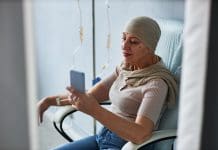A tablet developed at King’s College London could make chemotherapy more effective by blocking a tumour’s key defence protein, early studies show
A team of King’s College London scientists has developed a potential companion drug that could make chemotherapy effective even against treatment-resistant cancers. By targeting a tumour-shielding protein produced by immune cells, the tablet called KCL-HO-1i has shown promising results in preclinical models. This offers hope for faster, more effective cancer care with fewer hospital visits, instilling a sense of optimism in the audience.
New drug boosts chemotherapy by targeting tumour macrophages
Chemotherapy is one of the most widely used cancer treatments, but it’s not always effective. One primary reason for this is a specific group of immune cells that act as a barrier around tumours. These white blood cells, called macrophages, surround the blood vessels inside tumours, blocking helpful immune cells from entering and supporting the responses to chemotherapy.
Now, a spinout company, Aethox Therapeutics, has found that these macrophages make a protein called heme oxygenase-1 (HO-1), which helps shield the tumour from the immune system and block the effects of chemotherapy. The new drug, KCL-HO-1i, targets this protein.
Professor James Arnold, Head of Tumour Immunology Group, King’s College London, said: “We discovered that these macrophages in cancer play a key role in blocking chemotherapy. By targeting the enzyme they produce using KCL-HO-1i, we were able to help beneficial immune cells and chemotherapy drugs become significantly more effective. In laboratory models, even chemotherapy-resistant tumours became responsive to treatment, which is a fascinating step forward.”
New hope for patients with resistant cancers
KCL-HO1i, designed to be used at home as a tablet between chemotherapy sessions, offers the potential to reduce the added burden of hospital visits, providing a sense of relief to patients and their families.
In early tests using mouse models of breast cancer, the drug made tumours more responsive to a range of commonly used chemotherapies. These promising results suggest it could be used across a wide range of cancers and chemotherapies.
The researchers hope that with funding, clinical trials on breast and other cancers could begin within two years. If successful, the drug could potentially be available for widespread use within the next five to ten years.
Professor James Spicer, Professor of Experimental Cancer Medicine, King’s College London, said: “Chemotherapy remains a key part of treatment for many patients with cancer, but too often it is not as effective or long-lasting as we might like. This research has identified a key reason for these limitations, and discovered a drug that we are keen to test in the clinic alongside established chemotherapy drugs”.
Using combination therapies can help bring improved treatment options to patients more quickly, safely, and affordably, because some components of the treatment have already been tested and used in the clinic. The potential addition of KCL-HO1i to existing chemotherapy regimens could help to reduce the overall cost of cancer treatment.
While in the early stage, it’s exciting to see this potential new way to disarm cancer’s ability to avoid detection by the immune system with a new drug, while also boosting the effectiveness of chemotherapy, and we look forward to seeing how this work progresses.”
“If human trials are successful, KCL-HO-1i could become a valuable companion drug to existing cancer therapies – helping more patients to benefit from the treatments that are already available and reduce the need for more aggressive cancer therapies in the future,“ added Professor Miraz Rahman, Professor of Medicinal Chemistry, King’s College London.











